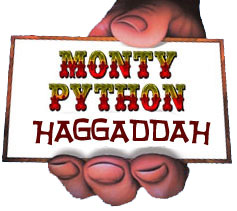
[ Download in PDF format | Download in DOCX (Word) format ]
Every year Jews tell the story of the Exodus from Egypt at our seders.
Every year we tell
the same story, using the same words, from the same Haggadah. Even though we
appreciate the story, it gets boring hearing it told the
same exact way year after year after year. There is a Women's Haggadah, a Green
Haggadah, a Gay Haggadah, and even a Socialist
Haggadah, but (until now) you haven't been able to find a funny Haggadah.
With sincere apologies to Eric Idle, John Cleese, and anyone who takes religion
too seriously, here is the

[ Download in PDF format |
Download in DOCX (Word) format
]
Scene 1: In the Desert
Moses is galloping (skipping on foot while clopping coconuts
together to sound like hoofbeats) across the desert. He comes to a burning bush.
|
Bush: Halt! Who goes there! Moses: A shrubbery! A talking shrubbery! One that looks nice, but is not too expensive. It is a good shrubbery. I like the laurels particularly. Bush: Moses! Moses, Leader of the Israelites! (Moses looks stunned, drops to his knees in awe and bows his head to the ground in front of the burning bush.) Bush: Oh, don't grovel! If there's one thing I can't stand, it's people groveling. Moses: Sorry-- Bush: And don't apologize. Every time I try to talk to someone, it's "sorry this" and "forgive me that" and "I'm not worthy". What are you doing now!? Moses: I'm averting my eyes, oh Lord. Bush: Well, don't. It's like those miserable Psalms -- they're so depressing. Now knock it off. Moses: Yes, Lord. Bush: Right! Moses, leader of the Israelites, your people shall have a task to make them an example in these dark times. Moses: Good idea, Lord! Bush: Of course it's a good idea! Behold! This is your task - to cut down the mightiest tree in the forest with a herring. Moses: It shall be as you command. But should I use a schmaltz herring, matjes herring, or herring with sour cream and onions? Bush: Forget it. Instead, your task shall be to deliver the Israelites from bondage in Egypt. Moses: Wouldn't you rather have me deliver a pizza instead? |
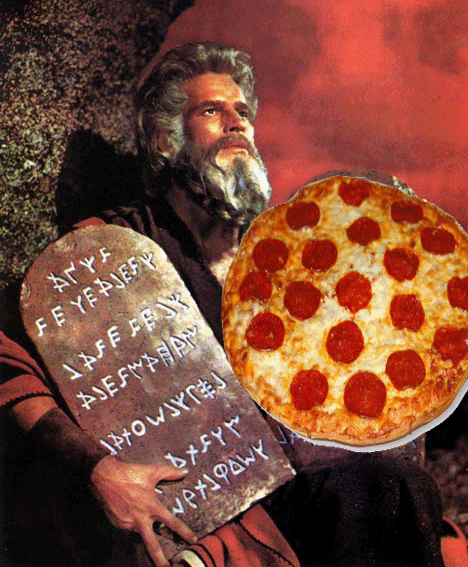 |
Scene 2: In Egypt
Moses: I never wanted to do this job of deliverance in the first place. At least delivering pizzas pays good tips! I wanted to be a lumberjack, even though its a bit hard doing that in the desert.
(Israelites sing)
Oh, we're Egyptian slaves. It's not OK.
We work all night and we work all day.
We quarry blocks and make mud bricks
And want to run away!
Scene 3: Asking Pharaoh to leave
Moses approaches Pharaoh and his advisors to ask for permission for the Israelites to leave Egypt.Scene 4: The Ten Plagues
| Killer rabbits. Dead parrots. The Spanish Inquisition. Silly walks. 1000-ton weights. Plague six. There IS no plague six! Crunchy frogs. Spam. Giant badgers. The killing of the first born. |

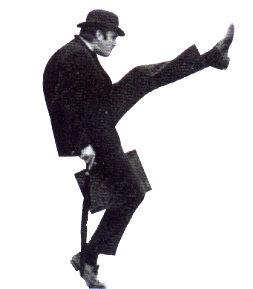
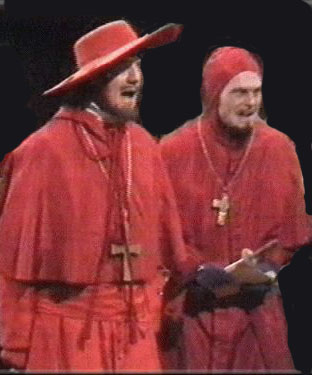 |
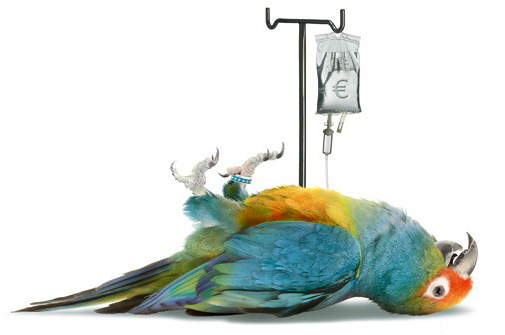
| Scene 5: The Exodus Aaron (addressing the assembled Israelite multitude): We need to sneak out of Egypt quickly without Pharaoh's army noticing. In this demonstration, we hope to show how to leave Egypt without being seen. This is Miriam of the Tribe of Levi. She can not be seen. Now I am going to ask her to stand up. Sister Miriam, will you stand up please? In the distance Miriam stands up. There is a clap of thunder and Miriam crumples to the ground. Aaron: This demonstrates the value of not being seen. |
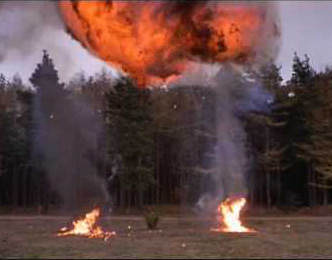 |
Stop! This is getting too silly!
Scene 6: Arriving at the Red Sea.
| The Red Sea guard challenges the fleeing Israelites as they arrive, saying, "None shall pass." Guard: What is your name? Moses: Moses. Guard: What is your quest? Moses: To reach the Promised Land. Guard: What are your favorite colors? Moses: Blue and white. Guard: You may pass. The Israelites pass through the Red Sea. Now Pharaoh's army approaches, led by Rameses.
Guard: What is your name? |
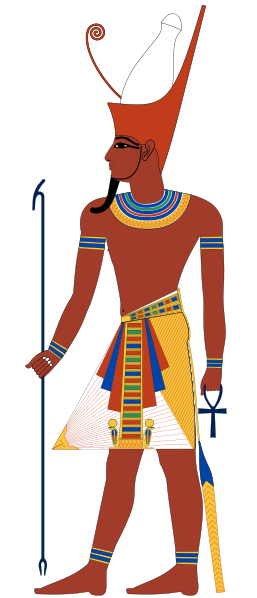 |
Aaron watches awestruck, then asks Moses how he was able to answer the questions so well. Moses says, "You have to know these sorts of things when you're a leader of the Israelites, you know."
Narrator: Forty years later, after wandering around in the desert searching for the Holy Grail, Moses and Joshua stumble across a dragon ship and sail across the river Jordan to swelling music, but just as everything looks like there will be a happy ending ....
Moses: No afikomen here. Let's head back.
And now for something completely different.
Scene 7: The seder plate
| To help us remember the story of the first Passover, we have assembled various symbolic foods
on a Seder
plate. There's egg and spam; shankbone and spam; greens and spam, bitter herbs
and spam, charoses and spam, and spam, and spam spam egg and spam; spam spam
spam matzoh and spam; spam spam spam spam spam spam baked beans spam spam
spam... Spam! Lovely spam! Lovely spam! But I can't eat spam, it's not kosher! I'll eat yours, dear. I'm Reform. |
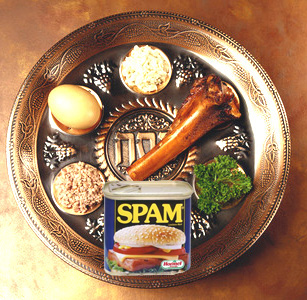 |
Scene 8: The Four Questions
|
Setting: A dusty street in an small
Egyptian city. Enter King Arthur and the Black Knight. Pause. Let the audience groan. Then continue. Yes, we know that's only one question, but who's counting? |
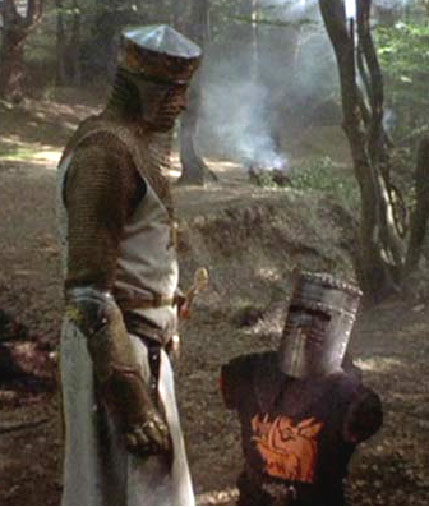 |
Scene
9: Dinner
It's time to eat dinner before finishing the rest of the Haggadah.
While eating dinner, make sure to defend yourself against the possibility that
the person to your right will attack you with a banana.
Scene 10: The Afikomen
The children are sent out of the room to find the Afikomen. They return,
shouting:
Children: An afikomen! An afikomen! An afikomen! We've got an afikomen!:
We have found an afikomen, may we eat it?
Father: Eat it! Eat!
Mother: How do you know it is an afikomen?
Children: It looks like one. It has warts on it. And it turned me
into a newt!
|
Scene 11: Elijah's Cup Well, it's just after eight o'clock, and time for to open the door for Elijah's penguin. (Participant opens the door and in comes a penguin. The penguin explodes.) |
 |
Scene 12: Conclusion
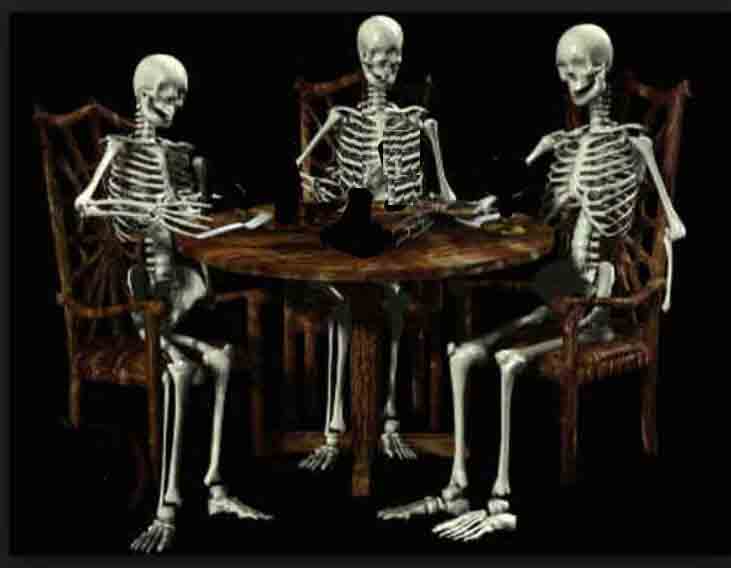
Narrator:
We conclude tonight's program with the question,
'Is there life after death?'. And here to discuss this question are three
dead people. The late Pharaoh Ramses, former ruler of the kingdom of
Egypt, circa 1400 BCE; the late Moshe
Well there we have it! Three say "No". On next
week's program we'll be discussing the question 'Does
the state of
THE END
(Updated April 2023)
Please email suggestions for how to improve this Monty Python Haggadah to kayton@alum.mit.edu. This page may be reprinted for personal or family use, but it is NOT okay to reprint it or use it for commercial purposes without permission. (c) 2003, 2006. Thanks to the Coplan family, David Frank, and Marne Rochester for their additions to make this haggadah even funnier (well, it's funny if you happen to enjoy Monty Python.)
If you liked this Haggadah , you might also enjoy the Facebook Haggadah and Grad Student Haggadah by Carl Elkin, and don't miss the Dr. Seuss-style Haggadah by Professor Eliezer Lorne Segal. Dave Barry co-wrote For This We Left Egypt. Also check out .If Moses Was on Facebook. produced by Shoot East and the video Darth Seder.
Check out the a capella group Six13 which has music videos of a pirate seder and a Billy Joel seder.